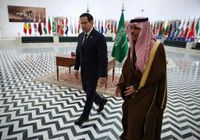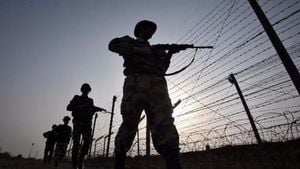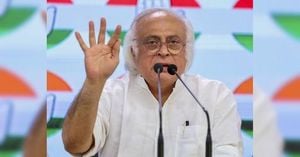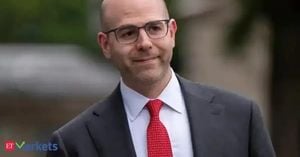In a significant policy reversal ahead of President Donald Trump's visit to Riyadh next week, Washington has abandoned its insistence that Saudi Arabia establish diplomatic ties with Israel before nuclear cooperation talks can proceed, according to exclusive information obtained by Reuters from sources familiar with the negotiations.
This policy shift represents a significant concession by Washington. During former President Joe Biden's administration, nuclear negotiations were part of a broader US-Saudi arrangement that included normalization with Israel and Riyadh's aspiration for a defense treaty with Washington. Saudi Arabia has consistently maintained it would not recognize Israel without the establishment of a Palestinian state, which hampered Biden administration efforts to expand the Abraham Accords signed during Trump's first term. Those agreements saw the United Arab Emirates, Bahrain, and Morocco normalize relations with Israel.
Progress toward Saudi recognition of Israel stalled due to outrage in Arab countries over the Gaza conflict, while nuclear talks had also faced obstacles related to Washington's non-proliferation concerns. In what might indicate a new approach, US Energy Secretary Chris Wright stated during his April visit to the kingdom that Saudi Arabia and the United States were on a "pathway" to a civil nuclear agreement.
When asked for comment, US National Security Council spokesman James Hewitt told Reuters, "When we have something to announce, you will hear it from the President. Any reports on this are speculative." The Saudi government media office did not immediately respond to requests for comment.
Even without the normalization requirement and despite separating the issue from a broader defense treaty, one source told Reuters that an agreement is not yet within close reach. According to Reuters, one persistent obstacle is Section 123 of the US Atomic Energy Act, which permits cooperation with countries developing civil nuclear capabilities but outlines non-proliferation criteria, including restrictions on uranium enrichment.
Saudi Energy Minister Prince Abdulaziz bin Salman has previously expressed the kingdom's intention to enrich uranium and market the product. One source informed Reuters that Saudi Arabia remains unwilling to sign a so-called 123 agreement that would prohibit enrichment or reprocessing of plutonium produced in reactors – two pathways that could potentially lead to nuclear weapons development. Secretary Wright previously told Reuters that a 123 agreement would be a necessary condition for any deal.
However, Wright has indicated there are various ways to structure an agreement that would satisfy both countries' objectives. One solution under consideration involves a "black box" arrangement where only US personnel would have access to a uranium enrichment facility on Saudi soil.
Riyadh aims to develop nuclear generation capacity as part of its strategy to diversify its economy beyond oil. Nuclear power could also allow more crude oil to be exported. Arms control advocates have previously voiced concerns about a Saudi nuclear program because Crown Prince Mohammed bin Salman, the kingdom's de facto ruler, has stated Saudi Arabia would quickly develop nuclear weapons if regional rival Iran did so.
US Vice President JD Vance on Wednesday described the talks with Iran as "so far, so good" and indicated there was potential for an agreement that would reintegrate Iran into the global economy while preventing it from acquiring nuclear weapons.
Saudi Arabia and the United States plan to discuss several major economic deals during Trump's visit next week, with the US prepared to offer Saudi Arabia an arms package valued at well over $100 billion. Trump has suggested Riyadh should increase a planned investment package in the US to $1 trillion from an initial $600 billion.
This trip marks Trump's second international visit, following a brief journey to Rome for the pope's funeral, since returning to office in January. During his first term, an extravagant trip to Saudi Arabia constituted his first overseas stop.
In another development, US Secretary of State Marco Rubio met with Saudi Foreign Minister Prince Faisal bin Farhan Al Saud in Riyadh on February 17, 2025, highlighting the ongoing discussions between the two nations.
Dropping the demand that Saudi Arabia establish diplomatic relations with Israel would be a major concession by Washington. Under former US president Biden, nuclear talks were an element of a wider US-Saudi deal tied to normalization and Riyadh’s goal of a defense treaty with Washington.
The kingdom has repeatedly said it would not recognize Israel without a guarantee of a viable path to a Palestinian state, frustrating Biden administration attempts to expand the Abraham Accords signed during Trump’s first term. Under those accords, the United Arab Emirates, Bahrain, and Morocco normalized relations with Israel.
Progress toward Saudi recognition of Israel has been halted by fury in Arab countries over the war raging in Gaza. The nuclear talks had also stumbled over Washington’s non-proliferation concerns.
On Tuesday, May 6, 2025, a senior member of the American negotiating team criticized Israel for failing to take advantage of the emerging agreement with Saudi Arabia. The official cautioned that Trump would no longer wait for Israel and was determined to move forward with the strategic agreement.
The official warned of a weakening alliance between Israel and the US, which greatly worried the families of hostages involved in ongoing negotiations. These discussions could potentially set their loved ones free.
Riyadh wants to build nuclear generation capacity because it seeks to diversify its economy away from oil. Nuclear power could also help free up more crude barrels for export. Arms control advocates have previously expressed concern about a Saudi nuclear program because Crown Prince Mohammed bin Salman has said the kingdom would seek to quickly develop nuclear weapons should its regional rival Iran do so.
The US and Iran are currently holding talks over Tehran’s nuclear program, which Washington and Western allies say is geared toward producing weapons. Iran insists it is purely for civil purposes. However, the Islamic Republic has enriched uranium to levels only necessary for military purposes and has called for the destruction of Israel since its founding.
Saudi Arabia and the United States are set to discuss a number of blockbuster economic deals during Trump’s visit next week, with the US poised to offer Saudi Arabia an arms package worth well over $100 billion. Trump has said Riyadh should “round up” a planned investment package in the US to $1 trillion from an initial $600 billion.
The trip is Trump’s second visit abroad, after a short trip to Rome for the pope’s funeral, since he returned to office in January. In his first term, a lavish trip to Saudi Arabia marked his first overseas stop. Trump fostered close ties with Gulf states, including Saudi Arabia, during his first term. The country invested $2 billion in a firm formed by Jared Kushner, Trump’s son-in-law and former aide, after Trump left office, and there are plans to build two Trump towers in Jeddah and Riyadh.




